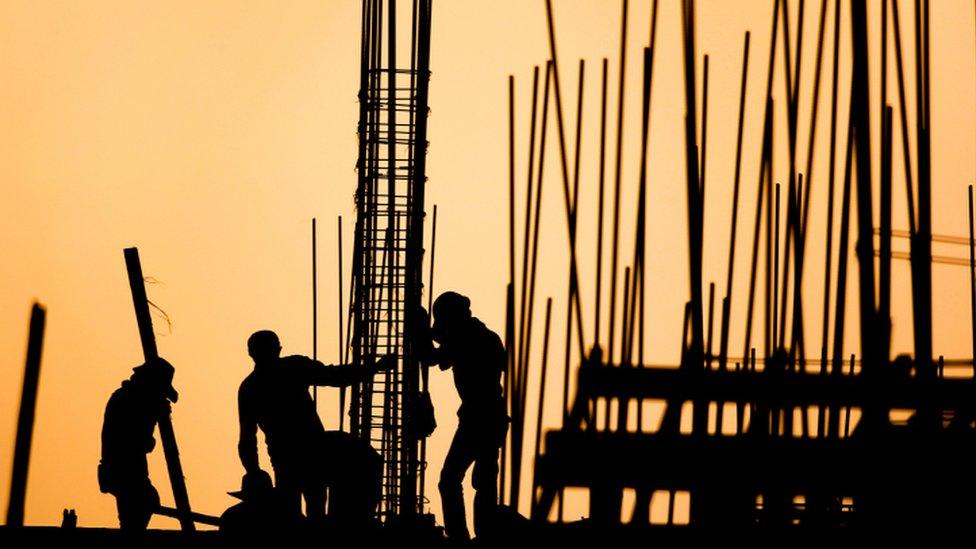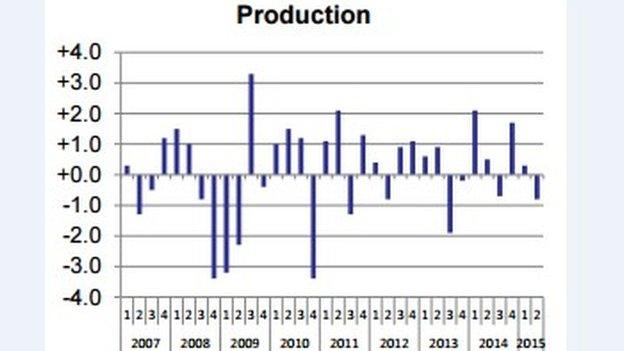Strong builders' tea while Scots economy cools
- Published

Something is mis-firing in the Scottish economy. The cause is partly business confidence and poor productivity. Problems with the oil and gas sector are clearly not helping. And partly it's the difficulties facing exporters into the eurozone.
Yes, the latest figures on Gross Domestic Product look disappointing, at 0.1% growth between the first and second quarter of the year. If it weren't for construction activity, the Scottish economy would have contracted between April and June.
Another quarter like that, and it would be a recession. The chief representative of small business warns that a sniffle could turn into something more sinister.
Construction has been the star performer for five quarters, growing much faster than civil engineering across UK as a whole.
In the year to June, it grew 18.5%, while across the UK, it was only 4%. Much of that is catch-up from the deep slump it faced with the last recession. It hit a trough in 2012, and since then has grown by 35%, according to Scottish government statisticians.
That has been helped by public spending on, among other things, a new Forth bridge and a motorway upgrade through Lanarkshire.
While the primary sector, of agriculture and fisheries, has contracted, the bigger sectors of production and services have been much more sluggish than construction.
Compared with 2012, production has grown by less than 4%. Most of that is in electricity, gas and water utilities. Manufacturing rose only 1% in that time, having seen a 4.2% drop in only two quarters.

Source: Scottish government statistics
The services sector (which makes up three-quarters of the economy) is up by less than 5% over three years.
Between the second quarters of last year and this, production has risen only 0.5% and services by 0.8%.
This doesn't compare well. While Scottish growth in the second quarter was 0.1%, it was 0.7% across the UK.
While the whole Scottish economy grew 1.9% in the year to June, the comparable figure for the UK was 2.2%.
UK service sector growth has been nearly 9% in the past three years, nearly double the rate of Scotland. In the past three quarters, UK services are up by 1.9%, and in Scotland, only by 0.2%.
Professionals
If you dig down a bit further into the sectors, the statistics tell us that finance and insurance contracted more than 1% in the most recent quarter, continuing a decline since the start of last year, and 3.6% over the 12-month period.
The star performer within the services sector has been the sub-division called "professional, scientific, administrative and support services" - up by nearly 1% in the quarter, and 15% up since 2012.
As a sub-division of production, manufacturing of metals and machinery was down more than 5% in a quarter, and transport equipment down by nearly 7%. Textiles had a happier time, up by 7.1%. That's after a very tough four years in the rag trade.
A final statistic which is very important in all this is the amount of output per head. With the population growing, largely through immigration, GDP is spread more widely. So while total GDP has risen by a small amount, the amount of output per head in Scotland remains 0.3% below its pre-recession peak seven years ago.
That's a lot of numbers. I concede this can be indigestible. But they add up to the economy becoming an increasingly important focus for attention going into the Holyrood elections next May.
Business organisations have used the opportunity to press for business rates reform and support to make small businesses "more resilient in the face of external shocks".
It's getting harder to sustain the argument that the Scottish economy has at least kept pace with the rest of the UK.